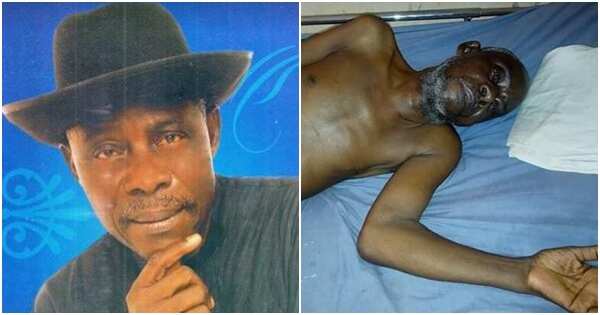Veteran filmmaker Eddie Ugbomah reportedly down with serious illness, needs assistance to pay medical bills
The movie industry is what it is today due to the iconic works of some of the veterans in the industry. They no doubt paved the way for others to follow.
Despite their great achievements, they seem to have been forgotten by the newer generation as they wallow away in poor health and finances.
Veteran Nigerian filmmaker, Eddie Ugbomah, is reportedly down with a serious illness and he even faces eviction from the hospital due to unpaid medical bills.
According to Facebook user, Shaibu Husseini, the veteran needs urgent and sustained medical attention.
PAY ATTENTION: Install our latest app for Android and read the best news about Nigeria
It was gathered that the hospital responsible for his care is no longer interested in treating him over his inability to pay his bills.

Eddie Ugbomah, veteran film director and producer
Source: Facebook
Husseini who is obviously a big fan of the filmmaker added that the veteran should not be allowed to wallow away as he called on well-meaning Nigerians to come to Ugbomah’s aid.
READ ALSO: Decades Later, How Some Of Our Favorite Celebrities From The 90’s Have Transformed Over The Years
The veteran film director and producer is responsible for making 13 celluloid films including the renowned Death of A Black President, The Rise and Fall of Oyenusi and Apalara, to mention a few.
We hope Nigerians come to his aid and he gets the much needed medical and financial assistance.
This is coming shortly after Legit.ng reported that 62-year-old actor, Alabi Yellow, is dying of stroke and living with his aged mother in a one-room apartment.
Reports making round in the online community have it that 62-year-old Yoruba actor, Samuel Oludayo Akinpelu, popularly known as Alabi Yellow, is currently battling with his life.
It was gathered that the actor who is well known for thrilling his audience with his onscreen performances, is down with stroke, and even more saddening, he does not have the financial capability to seek appropriate medical attention.
READ ALSO: Personal letter from the Editor-in-Chief of Legit.ng (formerly NAIJ.com)
HELLO! NAIJ.com (naija.ng) upgrades to Legit.ng We keep evolving to serve our readers better.
EXCLUSIVE: I’m not normal; normal doesn’t work in Nigeria - Klint D Drunk | Legit TV
Source: Legit.ng
from Nigeria News today & Breaking Naija news ▷ Read on Legit.ng 24/7 http://bit.ly/2Z8LcCT
via EDUPEDIA24/7
Comments
Post a Comment